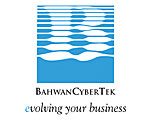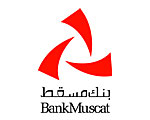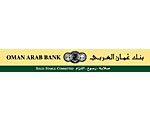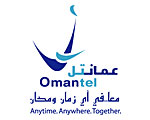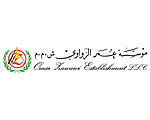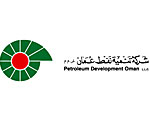Source: ITTS, www.itec.gov.om. Crimson Logic, SureshAgarwal@crimsonlogic.com
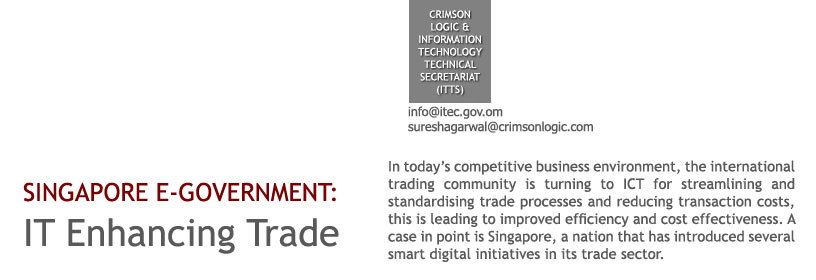
TradeNet: A Nationwide e-Trade Clearance System
In Singapore, traders are required to submit trade declarations for all imports into and exports out of the country to relevant governmental agencies. Prior to the implementation of TradeNet, the trade declaration process had involved a mountain of paperwork. Not only was the process tedious for traders, delays were common and this had a serious financial impact on businesses.
A nationwide Electronic Data Interchange (EDI) trade system was conceptualised and developed to harness technology and transform manual ways of doing business into a paperless process - TradeNet was born. TradeNet is an e-Trade clearance system developed by CrimsonLogic, a Singapore-based IT service provider - and brings together the functions and requirements of more than 30 trade controlling agencies. It allows traders and freight forwarders to apply for and receive trade permits for importing and exporting purposes via the Internet.
The new paperless trade facilitation system has resulted in streamlined workflow, better administration, improved productivity, increased efficiencies and reduced costs. Never had it been easier, more convenient and faster for the buyer or seller to conduct business with trading parties and collaborate with government authorities for the necessary permits and approvals.
SEW: An Enabler for Paperless Trade
Building on the strengths of TradeNet, the creation of the Single Electronic Window (SEW) has helped create even greater possibilities for e-Commerce. SEW can be defined as the single point of data entry to achieve a complete transaction with the government as well as stakeholders through multiple processing.
In Singapore, the SEW concept has been applied at a more extensive level in the realm of e-Trade. TradeNet allows over 2,500 establishments to have instant access to more than 30 controlling units for the mandatory submission and approval of regulatory trade applications. SEW’s benefits are manifold: authentication and validation of information, increased transparency, efficiency, cost savings and ease of data compilation. These add up to enhanced business performance. Now, traders wait for minutes not days to obtain the necessary documentation.
The practicality of SEW in providing for e-Payment of taxes and levies via direct debit from banks was keenly felt by traders and third parties involved. This provided a further impetus for the completion of trade processes in a faster and more efficient manner.
Small and medium-sized enterprises have an affordable way of performing essential pay-per-use services such as procurement, inventory visibility, freight, insurance, finance, electronic certificate of origin, permits and licences using a single portal called TradePalette (www.tradepalette.com).
Key to the success is the ability to re-use data across multiple functions in the same portal. The reduction of up to 10 multiple entries to just one by using the system also means minimising data errors, a predominant cause for delays in getting documentation approvals or shipping timeliness. Studies show that data duplication through Singapore’s trade facilitation system, covering key areas of commerce, transportation, trade finance, insurance, warehousing and government controls, contribute to a further savings of RO18.3m for a total of 8 million permit declarations in 2002.
Electronic Certificate of Origin
One of the latest developments in Singapore is the enhancement of the Certificate of Origin (COO) application. The fully web-based electronic system, jointly launched in April 2003 by CrimsonLogic and the Chambers of Commerce, allows exporters to apply for and print certificates of origin from any computer at anytime, thus saving the trading community time and money.
CertOfOrigin, as it is now called (www.certoforigin.com), is the world’s first end-to-end web-based COO application and certification system, providing a single interface for exporters to apply for the document conveniently. It is built on Public Key Infrastructure and supporting security-related technologies such as microprint, 2D barcode, digital signature, print control and optical watermarks, enabling secure and convenient approvals of documents required to authenticate the origin of the goods traded.
This exciting feature means that Singapore traders are better equipped to trade with their overseas counterparts electronically, bringing in more efficiency for the trading community. CertOfOrigin allows exporters to submit an application electronically from the comfort of their office or anywhere else. It also enables chamber officers to approve and certify COO applications online with easy retrieval of supporting documents through data integration capability built within CertOfOrigin. Immediate transmission of approved COO to designated recipients such as the banks, overseas buyers and customs officers has also been enabled in a secure electronic environment.
A Job Well Done
Governments providing the impetus for online trade administration raise immense opportunities for players to be totally integrated in a supply chain. Savings are realised as a result of efficiencies in government and business. Electronic trade at the international level would bring about even further benefits as to include greater levels of transparency and timeliness.
The implementation of initiatives such as TradeNet and CertOfOrigin illustrates how Singapore has successfully leveraged on IT, especially web-based technology, to streamline and automate trade processes, thereby creating an overall positive trading environment for Singapore.

